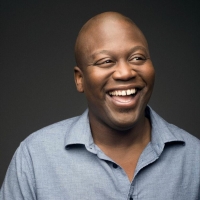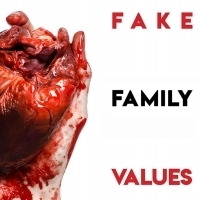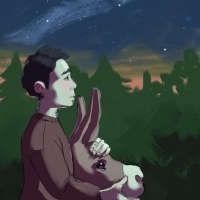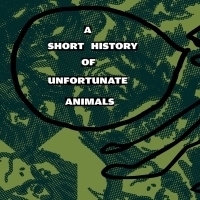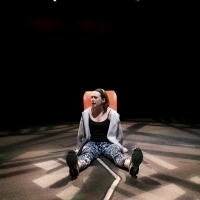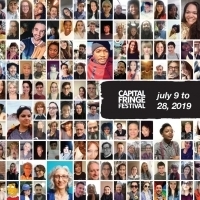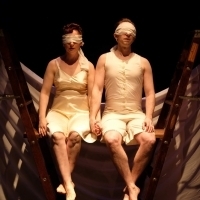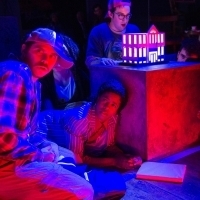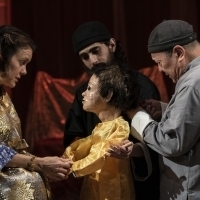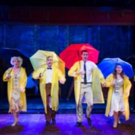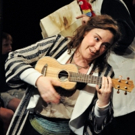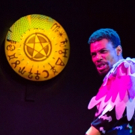Jack Read

Jack Read (he/him/his) is excited to be a part of the BroadwayWorld DC team. As both audience member and artist, he is excited by shows old and new, small and large that build and destroy and rebuild (and, hopefully, re-destroy) entire worlds with every performance. Jack is the Artistic Director & Co-Founder of The Wheel Theatre Company, and the Volunteer & In-Kind Coordinator for Thrive DC. He is also a proud cat dad and a recent cancer survivor.
MOST POPULAR ARTICLES
July 28, 2019
It's rare to see a show that feels like it could only happen in one place, at one time. Especially at The Kennedy Center, known for the utmost professionalism, temporal tightness and delivery of all its professional shows - you go to The Kennedy Center because you know you're going to see a show where everyone knows exactly what's going to happen and that it's going to be delivered to you as you expected. Which is one of the reasons that Tituss Burgess in Concert on July 27th felt like such a rarity - every second felt like a gift for this audience. In particular, one audience member - Burgess' mother.
July 25, 2019
The pitch for Thanksgiving at Macbeth's is about what you'd expect from a show called Thanksgiving at Macbeth's. Stitched together from a number of Shakespeare plays to create a 'new' play, it follows a badly behaved socialite family gathering for dinner as they're filmed for a reality television program. The text is prepared and 'remixed' by director Solomon HaileSelassie, and to HaileSelassie's credit, the text is well-assembled.
July 26, 2019
Dreamer/Seeker, written by Devan Andrews and directed by Rocky Nunzio, is one of this year's several Capital Fringe offerings that use one of Shakespeare's plays as inspiration. A longstanding tradition, there's a seemingly infinite number of ways to remix the canon; this show uses both a production of A Midsummer Night's Dream and that play's ideas of dream logic as a jumping off point.
July 20, 2019
While it takes a few minutes to really start moving, Natasha Preston's Conversations - which she wrote and performs - is one of the most emotionally raw and honest pieces of theatre I've seen this year. Preston has taken a period of personal tragedy and funneled it into a multi-layered show that connects with audiences. That's not an easy feat when you're exploring your own history, but she does it skillfully.
July 20, 2019
There's a moment in Intimate Dinner, written and performed by Lauren French, that made me laugh harder than anything in the Capital Fringe Festival so far, and it's a quiet gesture - she just swings a towel onto her shoulder. It's not a punchline - it's just a small character moment - but it registers as deeply human. French is a remarkably talented actress, so in tune with her physicality and voice that every one of her 20 characters feels instantly real.
July 19, 2019
Described as 'a dark romp with teeth' - a wonderfully evocative tagline - A Short History of Unfortunate Animals is one of the more abstract Fringe offerings this year. Choreographer, performer and writer Lorien House (writing under the name Glena Trachta) presents, in just 45 minutes, a series of vignettes - four, to be exact.
July 15, 2019
Capital Fringe is one of the best places to catch artists self-producing work in DC, many of them for the first time. One of this year's standout offerings, Codependent, is a swift, funny and heartfelt comedy written by Julia Karis and Emily Rekstis. Over the course of 75 minutes, we follow best friends Allie and Mia through their last 24 hours living together after eight years of, well, codependency.
July 11, 2019
I'll get this out of the way: one of my biggest theatrical pleasures is when entire worlds are created and destroyed and recreated in front of us. So, I'm an easy target for a show like She Sings Light, one of the Capital Fringe Curated Series, in which one of the first things we see is the ensemble literally rip their multi-purpose platform apart - the same one shared by fellow Curated shows Shakespeare's Worst and Hatpin Panic, designed by Willow Watson - revealing a planet divided metaphorically and literally. This happens throughout the show, indicating both change in scenery and the purpose of this beguiling, enthralling and moving fable - the world breaks, and the world rebuilds, and breaks again. Repeat.
July 10, 2019
As part of this year's Fringe Curated series, Hatpin Panic by Iris Dauterman is a relevant romp through the long-running suffrage movement with a heart of giddy resistance. The opening scene is set at the turn of the 20th century where a group of women defend themselves from street harassment using their hatpins. This is a true story, one that has gotten lost in history's many shuffles, and watching how this decision ripples is both entertaining and sobering.
July 8, 2019
There are 90 shows at Capital Fringe this summer, and a vast majority of them are from local artists. But there's a handful of individuals coming from outside the District to present their work, among them Raleigh's Burning Coal Theatre Company. They'll be bringing an encore of Iphigenia in Splott by Gary Owen, a solo show inspired by the story of Iphigenia.
July 1, 2019
The Capital Fringe Festival, now in its 14th year, has undergone many changes, but one thing has remained a constant: there's a wide assortment of things to see. Presented by artists local to DC and traveling in from other areas, if you have a theatrical itch, something at Capital Fringe will scratch it. This is the festival's second year being based out of the Southwest Waterfront area while work is done on their new space near H St, and on Friday June 28, artists and audiences gathered at Market SW to sample some of what's being offered this year.
June 26, 2019
There's one thing I find comforting about theatre that I take care to remember: we will always find new ways to tell old stories. In particular, it seems like our theatrical landscape repurposes the stories of the Greeks at a breakneck pace. Hadestown, Anais Mitchell's retelling of Eurydice and Orpheus, just won the Tony for Best Musical. In the District, Klytemnestra at Theater Alliance gorgeously reframed a maligned Queen through the lenses of Black ancestry. And now Happenstance Theater, utilizing devised, ensemble-based storytelling, is closing out their run of the dynamite Pantheon, a handful of myths and stories I thought I knew. What is Pantheon? The program notes that the title refers to both the Roman temple that transported us to stories, and to the array of Greek myths at our disposal. There's a few here you know, and maybe a few you might not. It wouldn't matter if you knew any of them or not, however, so clear is Happenstance's physical storytelling. It's hilarious and breathtaking and wholly unique.
June 18, 2019
Forest Treas (pronounced 'Triage'), the season closer for Pointless Theatre Company, is a new work by Navid Azeez inspired by the October 2002 sniper attacks that looks at the effects of the media - specifically, omniscient cameras - on a community facing ongoing tragedy. The show is a sharp mixture of physical storytelling - Pointless' bread and butter, and never better than here - and live cameras and projections. It's a successful mixture, with many meaningful stage images. Forest Treas manages to mostly become a memorable and touching affair, though there are moments that are more successful than others.
June 12, 2019
The central performance in Sarah Ruhl's The Oldest Boy, now playing at Spooky Action Theater through June 30, belongs to the ensemble as a whole. The title character, a reincarnated Tibetan Buddhist lama, is brought to life not by a single actor, but by the seven actors that create his world. Some are more directly responsible than others - the puppeteers, for example, move him from one place to another, help him to look where he needs to, help him to hold things - but all are crucial to helping us believe in him. When his mother looks into his eyes, we think we can catch him breathing. It's a leap of faith on our part, one that yields some of the richest results any show will bring this summer.
June 4, 2019
Certain shows are practically foolproof bets for audiences. A Midsummer Night's Dream, for example, is such an exquisitely crafted play on the page that a good time is all but guaranteed. Singin' in the Rain, the stage musical based on the 1952 film directed by Gene Kelly and Stanley Donen, is one of those guarantees. But NextStop Theatre Company's new production, their 2018-19 season closer, is not complacent to simply let the natural charms of this show lure in its audience. They've built a showcase for a dynamic ensemble of on and offstage talent, and the work put into every single moment is palpable and dazzlingly joyful.
June 1, 2019
There's several places to see Greek theatre in DC right now. It's not uncommon for artists to find relevance in the centuries-old works of Aeschylus and Sophocles and use their stories as a way of examining our lives today. But Klytemnestra: An Epic Slam Poem, now playing at Theater Alliance, does more than simply find truth in an ancient work: it tells a story existing in many places and many times, of now and then, not one or the other but both living and breathing at once.
May 21, 2019
WSC Avant Bard's Script in Play Festival, started in 2016, has been an opportunity to test out shows for full production treatment through the guise of a series of staged readings and post-play discussions. Written and performed by rising professional talent, these readings have led to some memorable productions, including new versions of Shakespeare's Taming of the Shrew and Twelfth Night and Lauren Gunderson's hit Emilie: La Marquise Du Chatelet Defends Her Life Tonight. In 2017, a reading of playwright Matt Minnicino's 'distillation' - not 'adaptation,' as we get into below - of Moliere's The Misanthrope was performed. Written entirely in rhyming couplets, it follows a professional cynic who falls in love with an ingenue, and finds his devotion to insincerity tested. Now, it's the capper of Avant Bard's 29th season. I spoke to Minnicino about his career thus far, the adaptation process, and why audiences should be excited for this show.
May 20, 2019
Every year, hundreds of theatre artists and patrons gather to honor the work done on stage from the previous year. But just as important as getting the chance to acknowledge the craft of their peers are the many reunions that take place. Though the 35th Annual Helen Hayes Awards began at 7:30pm on May 13, the celebrating started much earlier as collaborators from productions both big and small started reuniting on the Waterfront, then quickly bled into The Anthem. Things got underway quickly; after hosts Felicia Curry and Rick Hammerly provided a snappy intro, the winners of the 47 categories were unveiled in a timely fashion, though never at the expense of the acceptance speeches. The Helen Hayes are never a short show, but last night, they ended just a hair after 10:30pm, a relatively early end before the afterparty. These are theatre artists we're talking about - pacing is everything.
May 8, 2019
The model that We Happy Few Productions has built and perfected over the last seven years is, for my money, one of the most admirable and sustainable of any theatre company in DC. Their goal is to make classical stories (traditionally Shakespeare, though they've wisely branched out of late) accessible to audiences by way of simple, direct storytelling. By utilizing smaller, versatile casts, succinct text preparation and adaptation, and straightforward yet dynamic design elements, they hone in on what makes a story endure by working the imagination. Every show by We Happy Few feels like an event, and I am especially fond of the energy they're bringing to Robert Louis Stevenson's Treasure Island, their first-ever traveling production - an apt format for this particular tale. This review covers the performance on Monday, May 6th at 7:30pm at Capitol Hill Arts Workshop.
May 3, 2019
Two years ago, lying on a couch in the #9 Lounge at the Evening Star Cafe in Alexandria, VA, I was eulogized. I had watched other audience members receive secret family recipes, help rehearse a marriage proposal, even destroy a speed limit sign with a hammer. But the card I drew was Death. So, naturally, I was eulogized in front of the rest of the audience. The thing my funeral had in common with all these other short vignettes was the sense that, without my involvement, none of this could happen. I mattered. When it was done, I opened my eyes, took the flower offered to me, and found my seat. The oration was by Quill Nebeker, my Medium for the evening.
Videos


